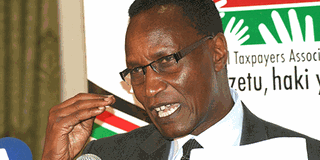Rampant insecurity shuts down 95 public schools countrywide

Education Cabinet Secretary Jacob Kaimenyi. Mr Kaimenyi on Friday told a teachers’ union to concentrate on its members’ welfare issues and let him do his work. FILE PHOTO | NATION MEDIA GROUP
What you need to know:
- In Garissa, Mandera and Wajir more than 1,000 non-indigenous teachers have refused to return to work since January for fear of terrorist attacks.
- More than 200 students of Garissa Teachers Training College have sought transfers following the killing of 148 students and workers at Garissa University College in April.
- Knut boycotted Tuesday’s meeting, saying it was a waste of time as it had no specific agenda.
More than 95 public schools have been closed countrywide because of insecurity, Education Cabinet Secretary Jacob Kaimenyi has said.
Of these, 23 are secondary schools.
Prof Kaimenyi said the government was doing everything possible to bring the situation back to normal.
Baringo, West Pokot and Turkana counties have been hit by cattle rustling conflicts that have left scores dead and several schools closed.
Refused to return
In Garissa, Mandera and Wajir more than 1,000 non-indigenous teachers have refused to return to work since January for fear of terrorist attacks.
Yesterday, Prof Kaimenyi admitted that learners in conflict-hit counties would find it difficult to compete with the rest of the country.
“We are working with the Interior Ministry to boost security so that learning can resume,” he said at a meeting of education stakeholders at the Kenya Insititute of Education.
More than 200 students of Garissa Teachers Training College have sought transfers following the killing of 148 students and workers at Garissa University College in April.
Kenya National Union of Teachers (Knut) Secretary-General Wilson Sossion Tuesday warned that teachers will not risk their lives.
“Teachers will not work in areas affected by insecurity such as the northeastern region. The government must address the issue of insecurity as a matter of urgency,” he said.
BOYCOTTED
Knut boycotted Tuesday’s meeting, saying it was a waste of time as it had no specific agenda.
Mr Sossion said Knut had not sent representatives because the ministry had ignored its input in the past.
“We did not attend the meeting because we believe it had no agenda and direction. If the Cabinet secretary wants to meet us, then our employer, the Teachers Service Commission must be there,” said Mr Sossion.
However, the Kenya Union of Post Primary Education Teachers (Kuppet) attended the meeting but warned that teachers would not play second fiddle in the education sector.
“We have to hear from all stakeholders as we want to be as consultative as possible,” said Prof Kaimenyi at the meeting.
He defended various policies the ministry has introduced, saying his officials have been as consultative as possible.
Prof Kaimenyi disclosed that the Ministry of Education had secured Sh9 billion from development partners for capacity building and training of teachers.
He added that the World Bank has also agreed to fund a curriculum review but did not disclose how much it would pump into the project.
The CS said those who are unhappy with the Basic Education Regulations 2015 should submit their concerns to the National Assembly’s Committee on Delegated Legislation.
Kuppet Secretary-General Akelo Misori warned the ministry against ignoring the input of teachers as they were key stakeholders
“The Ministry of Education knows who the stakeholders in the education sector are and we do not expect it to go out looking for activists and branding them stakeholders,” said Mr Misori.




